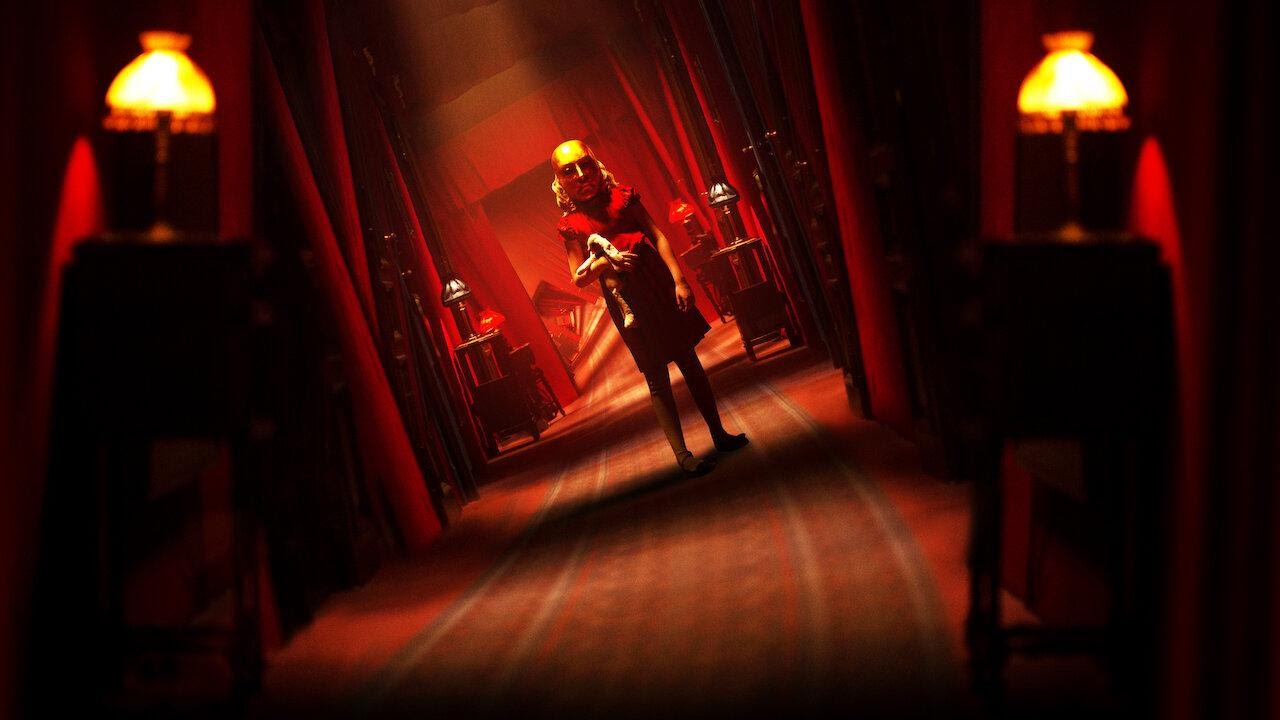What to Watch Verdict
Cadaver is made of ingredients that’ve churned stomachs before, but even with such artful performances, it’s a one-note night of limited experiential starvation terror.
Pros
- +
🔪Cinematography is maddening and stunning.
- +
🔪Straight to the bloody point.
Cons
- -
🔪Has a duller point than expected.
- -
🔪The power of the theater is a cheap facade.
The first Norwegian Netflix production, Jarand Herdal's Cadaver, is performative class warfare in the key of The Platform or Cannibal Club. Meal preparations are sourced and seasoned in secret, while impoverished masses are preyed upon by upper-crust socialites. Shakespeare's stageplays meet the Sawyer family's culinary traditions, but there's a familiarity that barely stirs Herdal's cutthroat feast or famine exploitation. We've seen titles such as Delicatessen or other dystopian dinner clubs, and Cadaver does little outside adapting New York City's famed "Sleep No More" immersive theater with an attraction-horror twist that's obvious from the very first frame.
In some nuclear aftermath metropolis, where the stench of death wafts from corpses on rubble-cluttered streets, Leonora (Gitte Witt) and Jacob (Thomas Gullestad) raise their daughter Alice (Tuva Olivia Remman). There's no power, no amenities, just whatever buildings are left undamaged enough to inhabit. The only building illuminated by electricity is a hotel where Mathias Veinterberg (Thorbjørn Harr) hosts elaborate productions that include a single meal for audience members. Patrons are then given a golden mask, and instructed by Mathias to explore his venue's deepest reaches since actors will be pursuing their narratives throughout the many chambers and hallways. Leonora's past as a dramatic actress causes situational excitement, which quickly turns to alarm when Alice disappears, and Mathias' generous hospitality is revealed for its chophouse intentions.
Herdal's production designs are inviting once cinematographer Jallo Faber sheds the gloomy cooled blue filter that designates dystopian dreariness before entry into Mathias' estate. The transition from decay-washed civilization to fine-dining waiters who distribute chunks of steak covered by silver cloches is an immediate red flag but introduces decorative sophistication. Tuxedoes on hosts, red carpets like rivers flowing down hallways, cruel paintings of lambs foreshadowing a viewer's experience. The camera favors theatricality, pitting extravagance and propper attire versus the smudgy-cheeked peasants who are merely trying to survive, exploited by those whose means once, and still do, hold classist powers. The manipulation through desperation is served via visual deliciousness.
As a horror story, Herdal orchestrates this Grand Guignol effect, recalling the notorious Parisian theater that specialized in "naturalistic horror shows." Mathias so devilishly introduces his night of mystery by insisting participants fear nothing since everything they witness is scripted entertainment. Bloodcurdling squeals, butchery, slit throats; all spectacle gore achieved through practical effects, or so wanderers believe. It's mature content, as Leo shields Alice's eyes from wall-banging intercourse, while elsewhere, relationships crumble or servers commit suicide. These horror elements are the appetizer before Leo's quest to locate Alice leads her into the slaughterhouse kitchen in the belly of Mathias' labyrinthian architectural beast. A few choice cuts show white-aproned carvers using deli slicers in ways I'll never unsee, while Mathias monologues about how humans can't just survive; they need to feel something along the way (his justification for grandiose fibs and Darwinian inhumanity).
It sounds so wickedly tantalizing, and yet, Herdal's script lacks the intrigue this fanciful feast requires. Cadaver, for all it's postured paranoia and societal warfare, is such a straightforward menu. That might not bother some viewers. In other cases, specifically mine, the backstory of a director's grief over the loss of his daughter, coupled with piles of clothes representing the countless bodies "sacrificed" to the cause, never creates a complete meal. The narrative's lack of hidden motivations doesn't value suspense, despite all the hulking henchmen and delusional affluence. I felt detached from a production that should have me wriggling in discomfort. It lacks flavor past picturesque representations, shortchanging depth beyond maximum plating efforts.
Cadaver never tries to be more than a satire about humanity's worst impulses, and a ravenous, hopefully deceptive one at that. For me, said deception never conquers. We're left shuffling through a house of carnivorous horrors alongside this woman who's offered an unthinkable choice. I mean, eat the rich before they eat you. Metaphors aren't digging past shallow graves, and Jarand Herdal's not mincing his global frustrations (or meats). Unfortunately, it's a recipe that borderline works for this critic who's sampled cannibalistic fare like waltzing through a Costco that's owned by Jeffrey Dahmer. I suspect that reaction won't be mirrored by general audiences seeking a sub-ninety-minute horror flick to stream on Netflix this Halloween. One that goes lighter on outright spooks in favor of socio-political commentary with grill marks.
Cadaver hits Netflix October 22nd 2020.
The latest updates, reviews and unmissable series to watch and more!
Matt Donato is a Rotten Tomatoes approved film critic who stays up too late typing words for What To Watch, IGN, Paste, Bloody Disgusting, Fangoria and countless other publications. He is a member of Critics Choice and co-hosts a weekly livestream with Perri Nemiroff called the Merri Hour. You probably shouldn't feed him after midnight, just to be safe.


